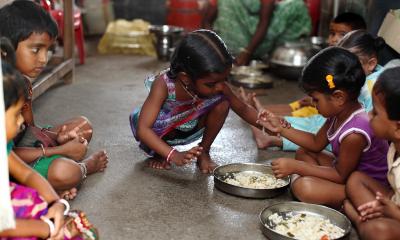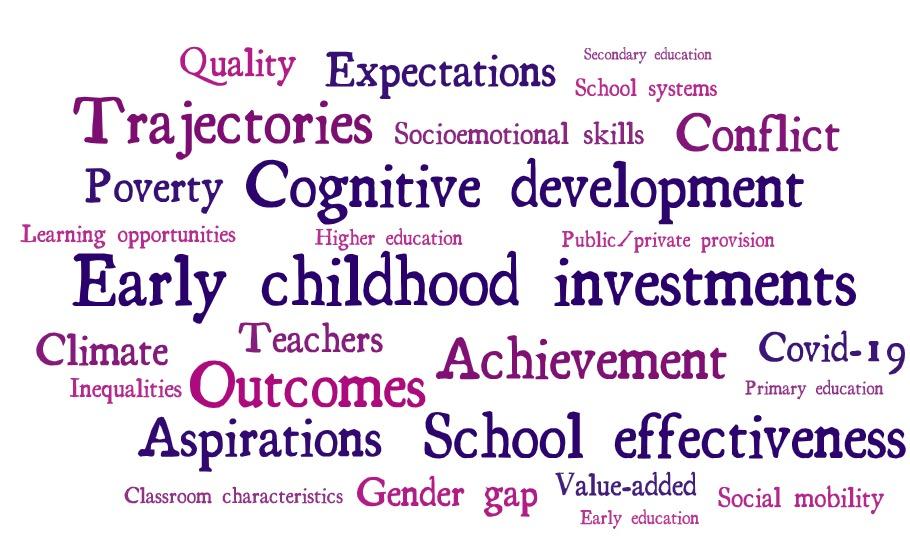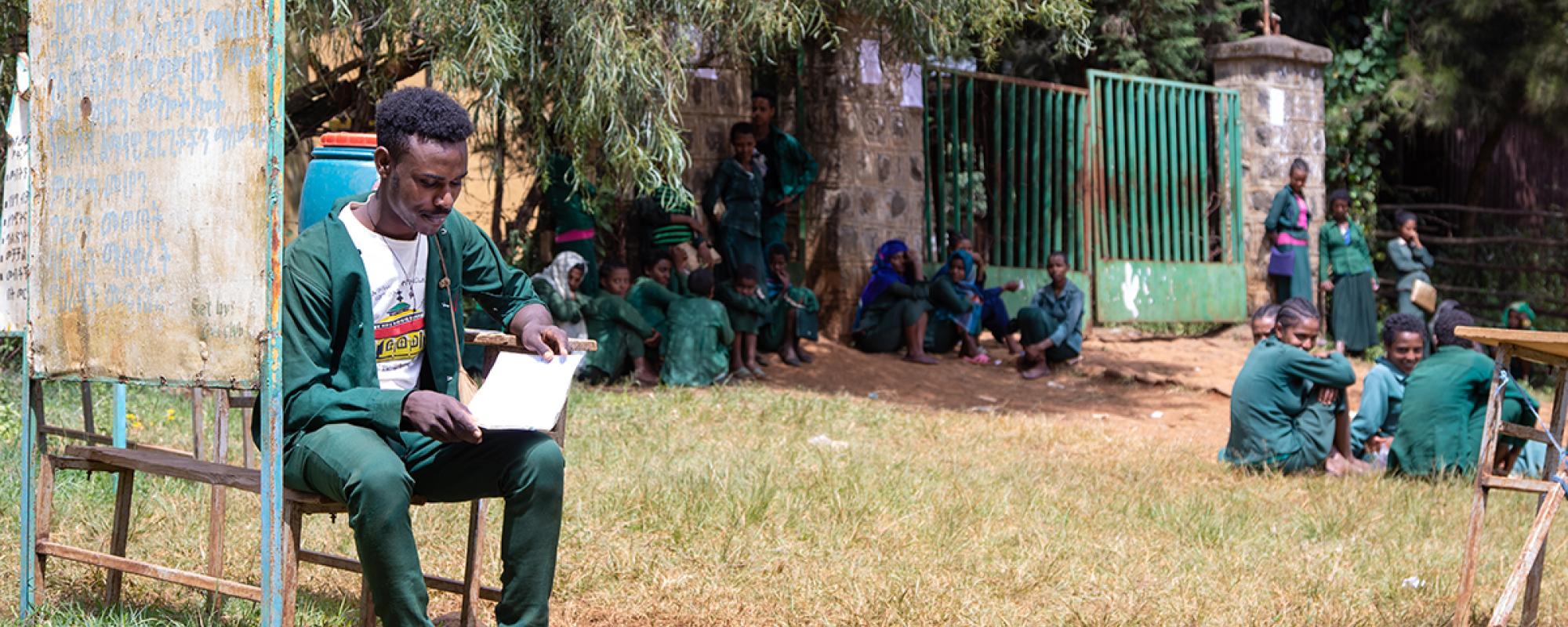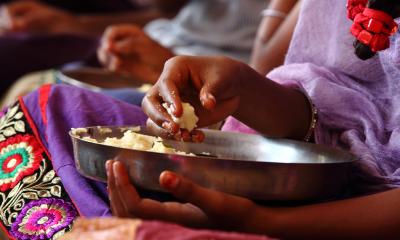
Twelve years of quality education for all children and promoting lifelong learning opportunities is fundamental to young people reaching their full potential, as set out in Sustainable Development Goal 4.
Over the last two decades, we have seen significant improvement in access to education across all our study countries, with increased school and university enrollment rates and reduced overall levels of student dropout.
Yet despite these gains, overall learning outcomes remain significantly different with progress uneven across and within our study countries. Moreover, the young people in our study have started their adult lives having to navigate a series of unprecedented global crises which have deepened inequalities in education and skills.
Young Lives' unique mixed methods data on education is collected through our household and school surveys, in-depth interviews with children and their families, teachers and head teachers, and pioneering research on how cognitive, socio-emotional and job-related skills develop.
With this data now spanning over two decades, Young Lives can track the skills development and educational and learning journeys of our study participants from infancy to early adulthood.
Whilst vocabulary skills have improved in all four countries, maths skills have fallen in India and Ethiopia. School completion varies significantly with late enrolment and slow progression through grades still very common in Ethiopia. Children from the poorest households, and from rural or minority status communities consistently under perform.
Intersecting early life inequalities impact childhood skills development and learning, with consequences for education and employment in young adulthood. Malnutrition during infancy and early childhood has severe consequences not only for physical growth but also for cognitive skills, socio-emotional skills and educational attainment. Malnutrition affects educational attainment by impacting foundational cognitive skills (FCS)—working memory, inhibition, declarative memory and implicit learning - which matter for learning outcomes through adolescence into young adulthood.
Gender is also important, though girls are not always disadvantaged. For example, girls have lower aspirations and under perform in learning outcomes in India, typically leaving education earlier than boys, but they have higher aspirations and outperform boys in Vietnam. Gender differences in socio-emotional skills, particularly those associated with empowerment, widen during late adolescence for young women across all countries.
Where gender intersects with other inequalities, such as wealth, rural location and minority status, and traditional gender roles are more prevalent, adolescent learning and outcomes are more profoundly affected. Girls who drop out of school, especially in rural areas and among poorer households, are much more likely to be married off early by their parents, than those who stay in education. Likewise, early motherhood puts girls at much greater risk of dropping out of school, as well as having detrimental effects on the health of the baby.
Investments in early child development and pre-school education services can have a positive impact on skills formation, provided services are of a sufficient quality. Unfortunately, access to pre-school educational services remains very uneven across the four countries. In Ethiopia, persistently low levels of pre-school enrollment remain, despite the roll-out of the 'O' call.
The education system itself can perpetuate existing inequalities, as disadvantaged children typically at tend low quality schools and higher education institutions. However, schools and education reform can reduce inequalities and improve opportunities and outcomes for children from disadvantaged backgrounds. In Peru, Young Lives evidence shows that the 'Jornada Escolar Complete' reform led to improved educational outcomes and reduced learning gaps across a number of public secondary schools, and the school meal programmes in India supported school attendance.

Young Lives evidence shows that shocks and crises impact children's and young peoples' skill formation, learning progress, access to education and higher education outcomes.
The COVID-19 pandemic exacerbated inequalities in education following the closure of schools and universities and disrupted classes. Evidence from our 2020 - 21 phone survey shows that young people from poor households and rural communities, especially vulnerable girls and young women, were hardest hit by interrupted education. The Covid-19 pandemic is likely to have undone part of the progress made on enrolment, especially in those countries most severely affected by the crisis.
Childhood exposure to climate shocks, such as droughts and floods, impacts children's development, affecting their nutrition, skills formation, learning progress and access to education, with the poorest children most affected. Early life exposure to rainfall shocks particularly during gestational periods affect the future development of the child's vocabulary by age 5 as well as their foundational cognitive skills by age 12. By addressing nutritional deficits and food insecurity, social protection programmes can remedy inequalities by improving cognitive abilities, remediating for the impact of early climate related shocks.
In times of economic crisis, a higher education degree, as well as better skills act as coping mechanisms by enhancing the likelihood of securing a stable job. Yet, higher skills and educational attainment do not necessarily boost women's rates of paid work, particularly as the pandemic led to their having a disproportionate burden of unpaid care work.
Our latest survey — Round 7 — completed in 2024, together with 20 years of data and research evidence, will enable a thorough investigation of the educational trajectories and skills formation spanning two decades of life, and across different country contexts and education systems.
Key research areas, all taking into account the role of gender, ethnicity and early-life vulnerabilities as driving factors of any differences observed, include the:
- educational trajectories and learning of the children of the Millennium from pre-school to tertiary education and on to the labour market;
- quality of education and consequent impact on learning trajectories and labour market outcomes;
- developmental plasticity of skills over the life course and their interaction with nutrition and mental health;
- impact of shocks (Covid-19, climate change, and conflict) on educational trajectories and skills formation over the life course;
- remediation role of public programs to mitigate the effect of early life deprivation and exposure to shocks on educational trajectories, learning and the development of foundational cognitive skills.
Twelve years of quality education for all children and promoting lifelong learning opportunities is fundamental to young people reaching their full potential, as set out in Sustainable Development Goal 4.
Over the last two decades, we have seen significant improvement in access to education across all our study countries, with increased school and university enrollment rates and reduced overall levels of student dropout.
Yet despite these gains, overall learning outcomes remain significantly different with progress uneven across and within our study countries. Moreover, the young people in our study have started their adult lives having to navigate a series of unprecedented global crises which have deepened inequalities in education and skills.
Young Lives' unique mixed methods data on education is collected through our household and school surveys, in-depth interviews with children and their families, teachers and head teachers, and pioneering research on how cognitive, socio-emotional and job-related skills develop.
With this data now spanning over two decades, Young Lives can track the skills development and educational and learning journeys of our study participants from infancy to early adulthood.
Whilst vocabulary skills have improved in all four countries, maths skills have fallen in India and Ethiopia. School completion varies significantly with late enrolment and slow progression through grades still very common in Ethiopia. Children from the poorest households, and from rural or minority status communities consistently under perform.
Intersecting early life inequalities impact childhood skills development and learning, with consequences for education and employment in young adulthood. Malnutrition during infancy and early childhood has severe consequences not only for physical growth but also for cognitive skills, socio-emotional skills and educational attainment. Malnutrition affects educational attainment by impacting foundational cognitive skills (FCS)—working memory, inhibition, declarative memory and implicit learning - which matter for learning outcomes through adolescence into young adulthood.
Gender is also important, though girls are not always disadvantaged. For example, girls have lower aspirations and under perform in learning outcomes in India, typically leaving education earlier than boys, but they have higher aspirations and outperform boys in Vietnam. Gender differences in socio-emotional skills, particularly those associated with empowerment, widen during late adolescence for young women across all countries.
Where gender intersects with other inequalities, such as wealth, rural location and minority status, and traditional gender roles are more prevalent, adolescent learning and outcomes are more profoundly affected. Girls who drop out of school, especially in rural areas and among poorer households, are much more likely to be married off early by their parents, than those who stay in education. Likewise, early motherhood puts girls at much greater risk of dropping out of school, as well as having detrimental effects on the health of the baby.
Investments in early child development and pre-school education services can have a positive impact on skills formation, provided services are of a sufficient quality. Unfortunately, access to pre-school educational services remains very uneven across the four countries. In Ethiopia, persistently low levels of pre-school enrollment remain, despite the roll-out of the 'O' call.
The education system itself can perpetuate existing inequalities, as disadvantaged children typically at tend low quality schools and higher education institutions. However, schools and education reform can reduce inequalities and improve opportunities and outcomes for children from disadvantaged backgrounds. In Peru, Young Lives evidence shows that the 'Jornada Escolar Complete' reform led to improved educational outcomes and reduced learning gaps across a number of public secondary schools, and the school meal programmes in India supported school attendance.

Young Lives evidence shows that shocks and crises impact children's and young peoples' skill formation, learning progress, access to education and higher education outcomes.
The COVID-19 pandemic exacerbated inequalities in education following the closure of schools and universities and disrupted classes. Evidence from our 2020 - 21 phone survey shows that young people from poor households and rural communities, especially vulnerable girls and young women, were hardest hit by interrupted education. The Covid-19 pandemic is likely to have undone part of the progress made on enrolment, especially in those countries most severely affected by the crisis.
Childhood exposure to climate shocks, such as droughts and floods, impacts children's development, affecting their nutrition, skills formation, learning progress and access to education, with the poorest children most affected. Early life exposure to rainfall shocks particularly during gestational periods affect the future development of the child's vocabulary by age 5 as well as their foundational cognitive skills by age 12. By addressing nutritional deficits and food insecurity, social protection programmes can remedy inequalities by improving cognitive abilities, remediating for the impact of early climate related shocks.
In times of economic crisis, a higher education degree, as well as better skills act as coping mechanisms by enhancing the likelihood of securing a stable job. Yet, higher skills and educational attainment do not necessarily boost women's rates of paid work, particularly as the pandemic led to their having a disproportionate burden of unpaid care work.
Our latest survey — Round 7 — completed in 2024, together with 20 years of data and research evidence, will enable a thorough investigation of the educational trajectories and skills formation spanning two decades of life, and across different country contexts and education systems.
Key research areas, all taking into account the role of gender, ethnicity and early-life vulnerabilities as driving factors of any differences observed, include the:
- educational trajectories and learning of the children of the Millennium from pre-school to tertiary education and on to the labour market;
- quality of education and consequent impact on learning trajectories and labour market outcomes;
- developmental plasticity of skills over the life course and their interaction with nutrition and mental health;
- impact of shocks (Covid-19, climate change, and conflict) on educational trajectories and skills formation over the life course;
- remediation role of public programs to mitigate the effect of early life deprivation and exposure to shocks on educational trajectories, learning and the development of foundational cognitive skills.



